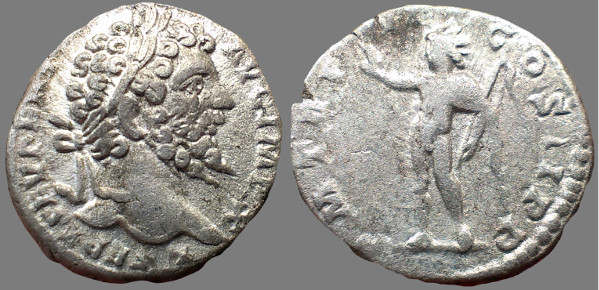
February 4, 2015, by Oliver Thomas
Death at York
As part of the Nottingham ‘Anniversaries through Coins’ project, Larissa Ransom describes how on this day, 4 February 211, the Roman emperor Septimius Severus died in York.
Lucius Septimius Severus was born in April 145, the son of the equestrian Publius Septimus Geta, in Lepcis Magna, North Africa.
In March 193 Pertinax, the successor of the assassinated emperor Commodus, was himself assassinated by the Praetorian Guard. The imperial title was auctioned off to Didius Julianus but, on 13 April, Septimius Severus was proclaimed emperor by his troops and he marched on Rome. Didius Julianus was murdered, allowing Septimius Severus to enter the city without resistance and to be recognised as emperor by the Senate.
Septimius Severus replaced the Praetorian Guard with 15,000 of his own troops. He then named his rival, Clodius Albinus, as ‘Caesar’, temporarily forming peace between them. He marched east and defeated yet another rival, Pescennius Niger, in Syria in 194. In his absence, Clodius Albinus had declared himself emperor. Septimius Severus defeated him near Lugdunum in February 197. Upon returning to Rome, Septimius Severus had Clodius Albinus’ supporters executed. He also declared himself the adopted son of a previous emperor, Marcus Aurelius, and a descendent of yet another, Nerva, to help solidify his imperial claim. He named his son, Caracalla, co-emperor and successor.
Having defeated his internal enemies, Septimius Severus continued to display skill as a general against the Empire’s external foes in the war against the Parthians. When back in Rome, he altered the government in his favour, granting the army a dominant role in the state. By increasing the pay of his soldiers, and permitting them to marry, he won their continued loyalty. He also reduced the number of legions under the control of each of his generals in order to prevent the rise of a military rival. He largely ignored the senatorial class, recruiting officials from the equestrian order instead, thus reducing the influence of the former.
In 208, Septimius Severus along with his two sons, Caracalla and Geta, marched to Britain to fight against the Caledonians. During the campaign Septimius Severus fell ill and, on 4 February 211, he died at Eboracum, which we know as York. Cassius Dio describes the funeral of the emperor:
His body, arrayed in military garb, was placed upon a pyre, and as a mark of honour the soldiers and his sons ran about it; and as for the soldiers’ gifts, those who had things at hand to offer as gifts threw them upon it, and his sons applied the fire. Afterwards his bones were put in an urn of purple stone, carried to Rome, and deposited in the tomb of the Antonines. It is said that Severus sent for the urn shortly before his death, and after feeling of it, remarked: “Thou shalt hold a man that the world could not hold.” (Dio 77.15)*
Septimius Severus’ last words to his sons were, “Be harmonious, enrich the soldiers, and scorn all other men.”* After the death of their father, Caracalla and Geta were proclaimed joint emperors , but their father’s exhortation to fraternal unity would fall on deaf ears.
* Translations by Earnest Cary (1927).
Image by Kelly Grimshaw: AR denarius of Septimius Severus. Obverse has L SEPT SEV PERT AVG IMP X, laureate head r. Reverse has P M TR P VI COS II PP, Sol, left, holding whip. 2.66g, 16mm, 7 o’clock.
No comments yet, fill out a comment to be the first

Leave a Reply